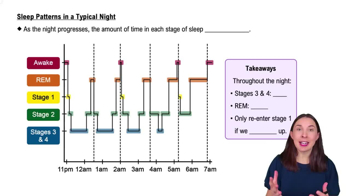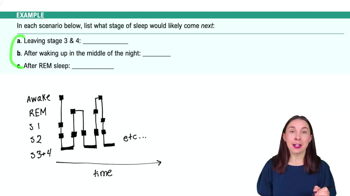Table of contents
- 1. Introduction to Psychology1h 43m
- 2. Psychology Research2h 20m
- 3. Biological Psychology2h 41m
- 4. Sensation and Perception28m
- 5. Consciousness and Sleep32m
- 6. Learning41m
- 7. Memory34m
- 8. Cognition37m
- 9. Emotion and Motivation35m
- 10. Developmental Psychology33m
- 11. Personality48m
- 12. Social Psychology41m
- 13. Stress and Health41m
- 14. Psychological Disorders44m
- 15. Treatment47m
5. Consciousness and Sleep
Sleep
Struggling with Psychology?
Join thousands of students who trust us to help them ace their exams!Watch the first videoMultiple Choice
Reiko feels hungry often and tends to overeat as a result. Reiko's physician explained to her that her blood sugar level is currently very high, and this has been known to cause an increase in a particular hormone, which can result in increased appetite and the tendency to overeat. The hormone that appears to be causing Reiko to overeat is called
A
glucagon.
B
leptin.
C
insulin.
D
glucose.
 Verified step by step guidance
Verified step by step guidance1
Understand the role of insulin in the body: Insulin is a hormone produced by the pancreas that helps regulate blood sugar levels by facilitating the uptake of glucose into cells.
Recognize the relationship between insulin and appetite: High levels of insulin can lead to increased hunger and overeating because insulin affects the brain's regulation of appetite.
Consider the context of Reiko's condition: Reiko's physician mentioned that her blood sugar level is very high, which suggests that her body might be producing more insulin to manage this excess glucose.
Identify the hormone linked to Reiko's symptoms: Given the information about high blood sugar and increased appetite, insulin is the hormone that fits this description, as it is directly involved in glucose regulation and can influence hunger.
Conclude that insulin is the correct answer: Based on the understanding of insulin's function and its effects on appetite, it is reasonable to conclude that insulin is the hormone causing Reiko to overeat.

 3:25m
3:25mWatch next
Master Circadian Rhythms with a bite sized video explanation from Hannah Gordils
Start learningRelated Videos
Related Practice


































































































![Race, Genes and IQ Differences | Bret Weinstein [Mini Clip]](https://img.youtube.com/vi/IztL_m3pd70/mqdefault.jpg)



































































































